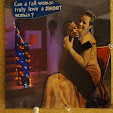My name is Xandra. I met my partner, Judy, in St. Paul in 1990.
I was twenty-nine and she was twenty-five. We moved in together in 1991. In 1997, we bought our first house. I was thirty-six, Judy was thirty-two. As we were preparing to close on it, Judy was diagnosed with cancer, and my father died unexpectedly. My mother died a year later. Judy’s father had a stroke in 2005, and my second-oldest sister died that year as well. I got cancer in 2007, which so far I have survived. I am now forty-seven years old, and Judy is forty-four.
We have also: spent time traveling to Mexico, Europe, and the Southwest, sung at the top of our lungs on road trips, gone to bed mad, woken up sorry, struggled to find meaningful work, gone to boring parties and fun ones, laughed and fought and made up, said things we regretted and said things we truly meant, and basically acted a lot like any other couple.
Unlike any other couple, we have not been able to secure our commitment to each other by marriage.
So, while we have coped with many of the usual challenges that people in their 20s, 30s, and 40s face, we have also coped with the kind of devastating losses that have uncoupled more devoted couples than we. During these difficult times, we lacked the state support for our commitment that would have made facing those challenges a little easier.
For example, we would not have had to consciously ensure that should I die or become disabled, Judy would have the right to see me and to make medical decisions on my behalf. Of course, since Judy had cancer already, we had the required paperwork on hand. Thank our lucky stars we both got good educations and knew how to avail ourselves of legal resources that many gay and lesbian couples are not aware of.
It’s frightening to face death: it’s doubly so when you know you might encounter medical personnel who disapprove of your choice of partner. I don’t know about you, but I don’t want the last face I see before I die to be someone who wishes me ill, and/or who wants to deprive me of the material comfort of the woman I have loved for nearly twenty years. It doesn’t matter to me whether they feel justified by their religious beliefs. This is something Judy and I have to think about, that many of you probably don't. We don’t have a choice about it.
Which brings me to my essential question: why is it okay for the state to treat us as though we were second-class citizens? Don’t we pay our taxes? Don’t I mow our lawn? I don't think, frankly, that it's any of your business what we do or don't do in our marital bed. I certainly don't go nosing into your marital bed: you can stay the heck outa mine, thank you very much.
I’m not going to go on and on about how deprived we are: we’re not. We have plenty to eat, plenty to do, we are not starving naked nor raving in the streets, nor are we being waterboarded, for which blessing I am thankful every day. But it does not logically follow that because we are not being tortured, that we are not being deprived of our civil rights. We are.
I have supported, and will continue to support, a wide variety of causes which I believe do good and help others to be heard. Now it’s my turn. Now I want support. I want to marry my partner, Judy, and I challenge you to provide me with a compelling, honest, constitutionally sound reason why I shouldn’t be allowed to.
Sincerely,
Alexandra Coe, second-class citizen of the United States of America
Subscribe to:
Post Comments (Atom)
Hall of Facebook Mirrors
the Xandra Coe Experience on Facebook




No comments:
Post a Comment